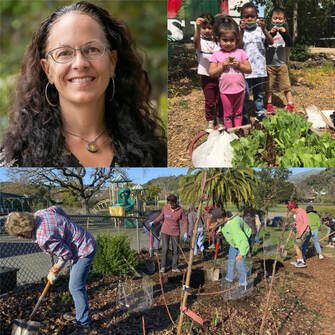 Community Action Marin CEO Chandra Alexandre, at top left, and volunteers working in the organization’s Old Gallinas Production Farm. Courtesy images.
Community Action Marin CEO Chandra Alexandre, at top left, and volunteers working in the organization’s Old Gallinas Production Farm. Courtesy images.
Adding a frightening pandemic that has spanned more than a full year to the mix, one in which Marin’s BIPOC residents have been disproportionately impacted across almost nearly every economic and social indicator, and you have a three-alarm fire of inequity, Alexandre says.
“Across the board, the needs have increased for the populations we serve,” she says. “One out of three people we were serving pre-pandemic were living paycheck to paycheck. These are mostly families that have two working parents, low wage workers who are living in poverty. Over the past year, those needs have increased.”
While its work remains as critically important as ever, Community Action Marin’s roots run deep.
Its inception stemmed from President Lyndon Johnson’s declaration of the “War on Poverty,” leading to the passage of the Economic Opportunity Act of 1964 and the Community Action Movement, which sought to provide a range of services to help move low-income Americans toward self–sufficiency. Founded in 1966, Community Action Marin is one of more than 1,200 such agencies in the U.S. and serves as the Marin County’s official antipoverty agency as well as the largest non-profit social services provider in the county.
Alexandre took the reins three years ago after two decades in social justice and policy advocacy work for organizations like the Global Fund for Women. On the heels of her years working to build women’s human rights internationally, the longtime Bay Area resident “wanted to come home and do the work to help in my own backyard,” she says.
Despite its long history of vital work within a community that is “rich with opportunities” and full of “people who care, Alexandre says, Marin remains the least equitable among California’s 58 counties by race across a range of indicators, with a population that is 85 percent white and a median household income just under $105,000.
“in responding to the needs of the community out of the pandemic, we’re also committed to changing the systems and structure that have perpetuated the inequity,” she says.
Because of that stark data and Marin’s high cost of living, the agency’s mandate covers a vast span, from those lacking housing and battling mental health issues to families of four earning $54,000 a year who work hard but simply don’t make enough money to make ends meet. Community Action Marin’s work extends to those at or below 200 percent of the poverty line.
Taking a “whole family” approach to its services, Community Action Marin’s $20 million budget provides an array of assistance, including state-subsidized childcare, rental assistance, economic support, financial literacy support, employment services and mental health assistance, including “warmlines” and access to crisis hotlines. Two-thirds of that budget supports high-quality early education. The agency is the grantee for Marin County for the federal Head Start program.
“It is deeply relational work, built on trust, to give people a sense of their own agency in taking pathways to self sufficiency,” Alexandre says.
In the past year, Community Action Marin has innovated on one of its key services and taken it to another level. In October 2019, the agency broke ground on the Old Gallinas Production Farm (see below) as a way to take control of its meal distribution programs, which span 19 sites in Marin.
“This production farm, as well as our commercial kitchen, addresses the urgency of putting food on the table and helps to ensure that families don’t have to endure food scarcity,” Alexandre says, noting that the farm had its first harvest early last year and also serves as a educational program for kids to learn about the need for a nutritional diet. “Having children learn about the ecosystem of food justice with culturally appropriate food – that is powerful.”
